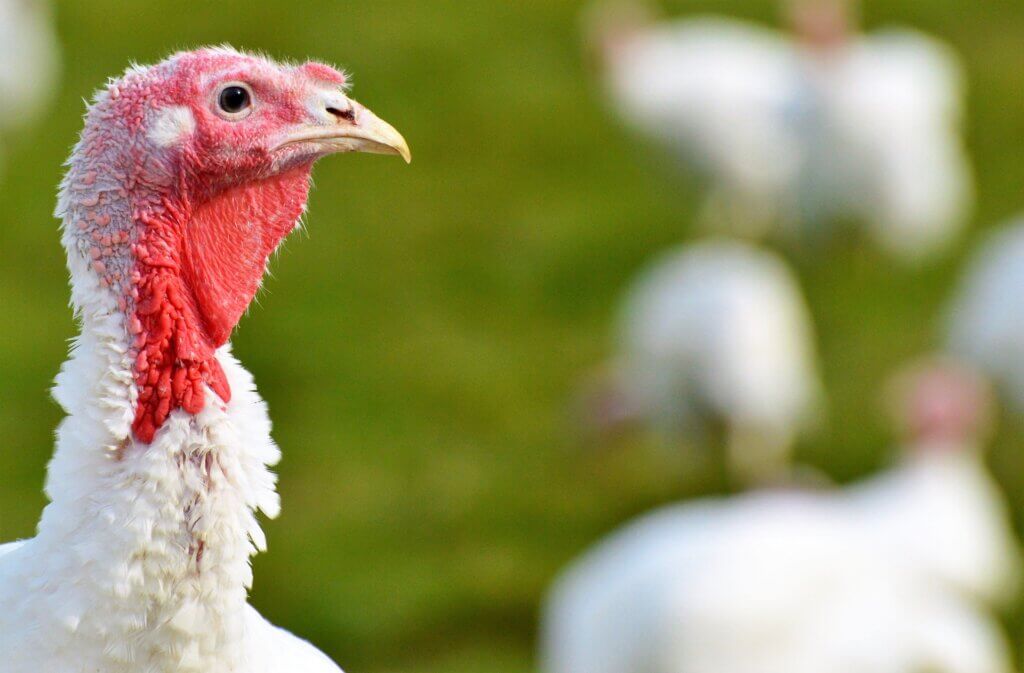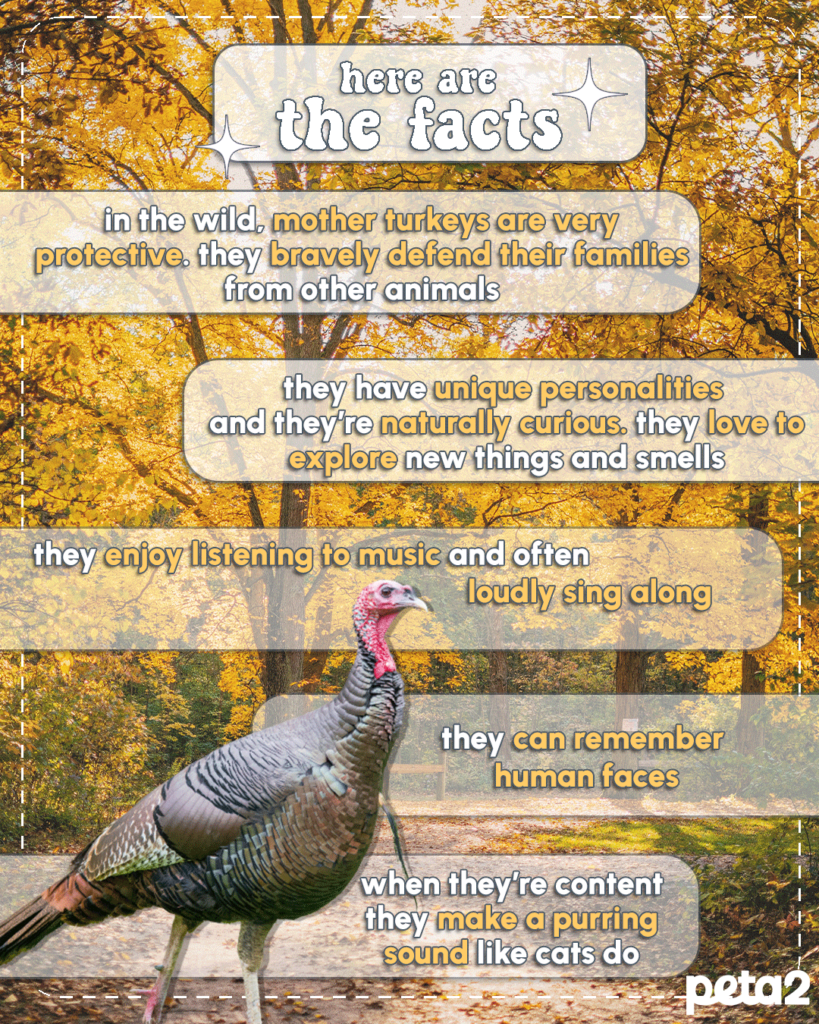12 Turkey Facts That Will Make You Give Up Eating Turkeys
The next time you’re craving a bird sandwich or thinking of celebrating your gratitude by carving into a gentle animal’s dead body, think of these 12 turkey facts—or send them to someone else who hasn’t begun their Tofurky era yet.

Turkeys or Social Butterflies?
Think of turkeys as socialites with feathers. They love greeting visitors, making friends, and hanging out with pals. They can recognize human faces, too, so you could be one of those pals if you play your cards right.
Turkeys Roll Deep
Turkeys are social animals who form strong bonds and show affection. The young ones stay with their moms, and the birds team up with other family groups to form large flocks. A group of related male turkeys will band together to court females, but only the one with the most rizz gets to mate—the rest of the bros are destined to be wingmen.
Male Turkeys Love the Ladies
Male turkeys are bigger than females, and their feathers are much more colorful. They flex with their fanned-out tail feathers, colorful wattles, mesofiloplumes (breast beards), and sick dance moves. The non-monogamous zaddies with the most drip will boast the highest body count.
Beauty, Brains, and Brawn
Have you ever looked at a turkey? They’re gorgeous! But their pretty heads are more than just a hat rack. Turkeys can distinguish which insects are dangerous to eat and which snakes are poisonous, visualize a map of their territory, plan ahead, and recognize patterns. They can also fly at speeds of up to 55 mph hour and run up to 25 mph. Get you somebody who can do both.
The Mothers Eat Up Maternity and Leave No Crumbs
Baby turkeys will stay with their mothers for the first five months of their lives, creating an unbreakable bond. And if a turkey mom thinks you’re acting sus around her babies, she won’t be afraid to make you catch these wings.
They’re Basically Kittens With Feathers
When turkeys are cuddling with each other or otherwise enjoying some affection, they make a purring sound similar to a cat’s purr.
Turkeys Are Natural Detectives|
Nosy—but make it adorable: Turkeys are curious and inquisitive animals. These Sherlock homies want to know who you are, what you look like, how you smell, and what snacks you have in your pocket.
Music Gives Them Life
Turkeys love gobbling along to their favorite tunes. They will literally try to sing along, loudly. It doesn’t sound great, but it’s cute as heck.
Turkeys Have Unique Body Parts and Built-in Mood Rings
Both male and female turkeys have spurs, wattles, caruncles, and snoods. And their heads and facial features actually change color depending on their mood—turning red, pink, blue, or white.
They’re the CEO of Naptime
Turkeys love to roost, aka nap together in groups. Their favorite place to get some shuteye is way up high in the branches of trees. When they wake up in the morning, they do a roll call to make sure everyone’s Gucci.
Not Turkeys Having Unique Interests and Hobbies!
Turkeys who aren’t confined and suffering on factory farms spend their days hanging out with their families, building nests, searching for snacks, taking dust baths, preening, and hanging out in trees.
NPCs Pay for 46 Million Turkeys to Be Slaughtered Every Thanksgiving
The meat industry genetically manipulates turkeys to grow as large as possible as quickly as possible. Workers cut off parts of their toes and beaks—as well as the males’ snoods—without any pain relief. This is to keep the frustrated birds from harming each other in such stressful, crowded conditions. Farmers deny turkeys the chance to roam free, breathe fresh air, feel the warmth of the sun on their backs, enjoy the comfort of their nest, or spend time with their families. Most turkeys are slaughtered when they’re only 5 months old. In slaughterhouses, these sensitive animals are shackled by their feet and their throats are slit—sometimes while they’re still conscious.

Turkeys can live happy lives for up to 10 years in nature. In case you didn’t understand the assignment, think for yourself and stop eating these awesome animals—go vegan.
Text peta2 to 30933 for ways to help animals, tips on compassionate living, and more!

Terms for automated texts/calls from peta2: http://peta.vg/txt. Text STOP to end, HELP for more info. Msg/data rates may apply. U.S. only.




